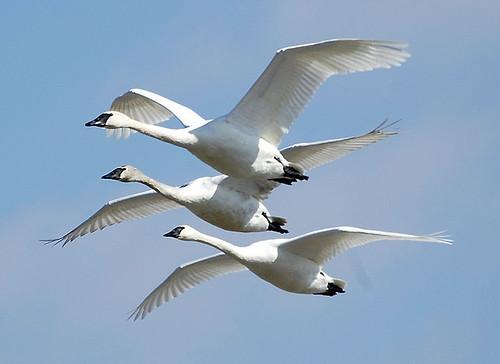Photos
Click to display full size or right-click to save to your device.
ARCHIVED NEWS RELEASE
This document is provided for archival purposes only. Archived documents
do not reflect current WDFW regulations or policy and may contain factual
inaccuracies.
News release Nov. 8, 2023
Contact: Kyle Spragens, 360-791-1933
Media: Jennifer Becar, 564-669-0850
OLYMPIA - Trumpeter and tundra swans are returning to Skagit, Snohomish, Whatcom, and other western Washington counties, and the Washington Department of Fish and Wildlife (WDFW) has re-established a hotline to report sick, injured, or dead swans in Washington as part of its ongoing effort to assess the impact of lead poisoning on trumpeter and tundra swans.
People can call 360-466-0515 to report swans that have died or need human help. Please note that this is a new phone number for the hotline. Callers should be prepared to leave a short message, including their name and phone number and a detailed location and condition of the swan(s). While swans are most numerous in western Washington, the hotline is open to reports statewide. The hotline is available through March.
"Swans migrate to our area based on conditions hundreds to thousands of miles away, as these birds spend their summers in Alaska, western Yukon, and northern British Columbia,” said Kyle Spragens, WDFW waterfowl section manager. “The swans have begun arriving back in Washington for the season, and we can use the public’s help reporting any sick, injured, or dead swans they encounter.”
Swans are closed to harvest in Washington, and lead shot has been banned for waterfowl hunting in the state since 1991.
“Unfortunately, swans can still pick up and ingest lead shot while foraging in shallow waters and in fields and roosts where lead pellets are still present,” explained Spragens. “If you see a sick, injured, or dead swan, do not handle or collect the bird; call the reporting hotline right away.”
Through these reports, WDFW and partners, including Puget Sound Energy and Snohomish Public Utility District employees, as well as volunteers from the Northwest Swan Conservation Association, know where to pick up these birds.
“With your help, this team response allows us to get birds to facilities trained in assessment and potential rehabilitation of swans while reducing secondary lead exposure to other wildlife scavengers,” said Spragens.
Through this process, Whatcom Humane Society was able to rehabilitate three swans last season, one of which was released in Whatcom County and sighted again near Whitehorse, Yukon a month later. WDFW and other agencies and organizations have been working since 2001 to document and locate sources of toxic lead and minimize potential exposure through management actions.
The Department also has a blog to help the public learn more about swan populations and viewing opportunities.
WDFW works to preserve, protect, and perpetuate fish, wildlife, and ecosystems while providing sustainable fish and wildlife recreational and commercial opportunities.
